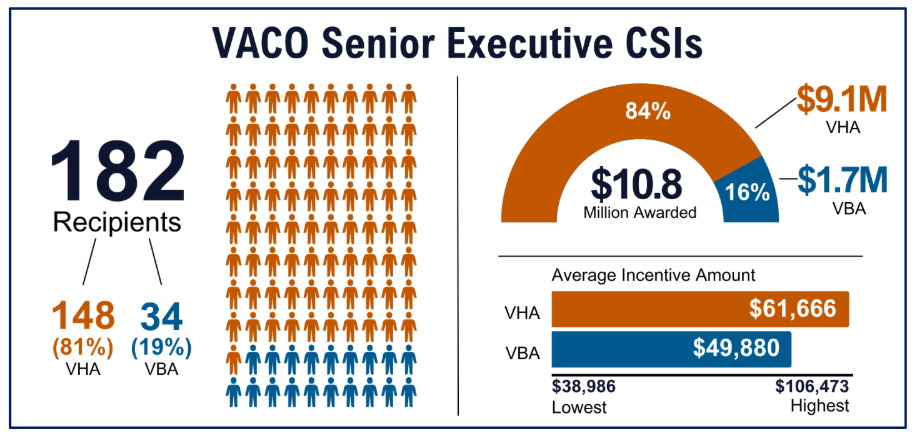VA paid nearly $11M in bonuses to ineligible executives, watchdog finds
A watchdog report finds breakdowns in communications — and leadership — led to the VA paying nearly $11 million in bonuses to ineligible career executives.
A watchdog report finds breakdowns in communications — and leadership — led to the Department of Veterans Affairs paying nearly $11 million in bonuses to career executives who weren’t eligible to receive them.
VA’s inspector general office, in a report released Thursday, found the department improperly awarded $10.8 million in critical skills incentives (CSIs) to more than 180 executives.
Congress authorized these incentives under the toxic-exposure PACT Act to help the VA retain employees with in-demand skills, or skills that are in short supply, and serve a mission-critical need.
VA OIG found a wider scope of improper bonuses than the department previously stated. The VA announced last September that it paid out $9.7 million in bonuses to 170 career executives at VA’s Central Office.
VA says more than 90% of critical skills incentives went to eligible recipients — including police officers, housekeepers and food service workers.
The department also continues to recoup bonuses it paid out in error. Investigators found the VA, so far, has paid $230 million of these incentives to non-executive employees in shortage positions.

VA Press Secretary Terrence Hayes said in a statement that the department “immediately cancelled and began recoupment for all CSI payments made to career senior executives at VA headquarters,” once the department discovered the error.
Hayes added that VA is revising and updating its CSI policies, “to ensure all future CSIs are awarded appropriately.”
“Moving forward, we will continue to work to ensure that everyone who receives a CSI meets the criteria to do so. This authority is critical to retaining and hiring VA public servants, especially at a time when we’re delivering more care and more benefits to more Veterans than ever before – and we will make sure that we are utilizing it effectively, correctly, and as responsible stewards of taxpayer money,” Hayes said.
House VA Committee Chairman Mike Bost (R-Ill.) said in a statement that “VA inappropriately used the money to line the pockets of VA executives to the detriment of VA’s workforce and the veterans they serve.”
“The over $10 million in overpayments to VA central office employees were not some type of administrative mistake – that’s a serious problem for the second largest agency in the federal government – and we’re going to get to the bottom of it come hell or high water,” Bost said.
‘I had no idea the sheer number of SESs’
Investigators found more than 80% of the improperly paid bonuses went to members of the Senior Executive Service at the Veterans Health Administration, and the rest went to executives at the Veterans Benefits Administration.
Under Secretary for Health Shereef Elnahal told investigators: “I had no idea the sheer number of SESs at VHA Central Office. I had no idea that we had upwards of 150 of them . . . I think if I had known that, my management instinct would be to get the same level of justifications together and the costs [as for the field executives].”
VA OIG found that VHA started developing its plan in late March 2023.
By early April, VHA workforce management staff prepared spreadsheets with all potential recipients of the critical skills incentive — along with their salaries and the total amount they would receive as bonuses.
Investigators found VA Secretary Denis McDonough did not learn about these incentives going to department executives until September 13, 2023, when he was alerted by the department’s chief financial officer.
“VHA never disclosed to Secretary McDonough the details of VHA’s plan to pay CSIs to all VACO senior executives, despite specific requests from the secretary regarding the planned use of these incentives in the months before they were awarded,” the report states.
After learning about the executive bonuses, McDonough requested the Office of General Counsel review the payments.
McDonough told investigators: “One can surely read the statute to say that [incentive payments to executives and central office] would be allowable . . . [However,] I have a hard time reading the statute and concluding that every senior executive in central office qualifies for a CSI. And I think that’s functionally where we ended up on the decision . . . to cancel them.”
VA’s Office of General Counsel concluded the awards were improper because the groups had been defined too broadly, and recommended canceling the awards.
“While staff attorneys in OGC had reviewed the plans in June 2023, they were not provided all available information and may not have had the same broad perspective as the senior attorneys who later found the awards improper,” the report states.
Among its recommendations, VA OIG says McDonough “should take whatever administrative actions, if any, he deems appropriate related to the personnel involved in the process for granting CSIs for VA central office executives.”
‘The trust is absolutely shot’
VA sent collection notices in late October to all senior executives who received critical skills incentives.
Executives who received the notices had the option to repay the bonuses by Dec. 31, 2023, or agree to a payment plan to recoup the bonus amount before the end of the tax year.
However, VA OIG said its investigative team received information suggesting VA’s handling of the critical skills incentives “had significantly damaged the morale of its senior executives at the central office, and that several had experienced financial hardship as a result of having to repay the incentives.”
Investigators say two senior executives retired from VBA “as a direct result” of the situation.
Another VBA official, who retired in December 2023, told investigators that, although he had already planned to retire soon, the recoupment made his decision easier.”
“Folks don’t have this money that was given to them,” a VA executive said during an October 2023 town hall, according to investigators. “Folks paid college tuition for their children. People paid off debt. People did all types of things to better their lives and now VA says we made an error [and we] want that money back. I think leadership really needs to see the human factor of what they’re doing because the accountability is gone, and the trust is absolutely shot.”
In addition to canceling and recouping the bonuses, McDonough rescinded his delegation of authority, which allowed VA under secretaries to approve their own senior executives’ awards.
The VA OIG found neither VHA nor VBA assessed whether the incentives it was paying to executives were necessary to retain them.
“VHA provided no market factors in support of its CSIs, and VBA’s justification was based on flawed assumptions, including that every senior executive was equivalent to a private sector CEO,” the report states.
Under Secretary for Benefits Joshua Jacobs told investigators that VBA’s “retention numbers are better than the six-year average” despite increasing workloads, which undercuts the proposed need for such a broad award of CSIs for retention.”
A senior executive in VA’s Human Resources and Administration/Operations, Security, and Preparedness office (HRA/OSP), who had concerns about the bonuses, said the approval process for these payouts paled in comparison to the requirements to justify much smaller incentives.
“I can’t even give a GS employee a special contribution award for $250 without writing an entire page about how great they are and forms and process. And this, with a stroke of a pen and three sentences, they’re saying these folks are critical because they’re critical, giving all these people this huge amount of money,” the official told investigators.
No executives at the National Cemetery Administration or any other VA program or staff office at VA headquarters received a critical skills incentive payment.
Under Secretary for Memorial Affairs Matthew Quinn told OIG investigators that NCA was aware of VHA and VBA’s plans to offer critical skills incentives to central office senior executives, but opted not to do so, because NCA didn’t have “a justifiable reason to do so.”
VA OIG notes that no political appointees or non-SES executives received these bonuses and that a “small number” of executives declined the critical skills incentives they were offered.
Senior HR personnel told investigators that the VA had broader and more flexible authority to offer critical skills incentives, compared to some of its other retention and recruitment incentives.
The Office of Personnel Management oversees those other retention incentives, and agencies can only offer them to employees who are considering leaving for private-sector positions — not other jobs within the federal government.
“CSIs are not subject to this restriction and may be paid to employees regardless of whether the risk of loss is to another federal agency or the private sector,” the report states.
VA may offer a critical skills incentive worth up to 25% of an employee’s basic pay. The report states seven senior VHA leaders were approved to receive incentives worth more than $100,000 each.
As these executive bonuses went through the approval process, a senior human resources official observed that with VHA’s proposed stacking of incentives, the salaries of some VA medical center directors could exceed a federal pay ceiling of $400,000 — the current salary of the president.
In order to receive the inventive payment, VA employees must sign an agreement to keep working at the VA for an “unspecified period.”
The critical skills incentive is set to expire on Sept. 30, 2027
Copyright © 2024 Federal News Network. All rights reserved. This website is not intended for users located within the European Economic Area.
Jory Heckman is a reporter at Federal News Network covering U.S. Postal Service, IRS, big data and technology issues.
Follow @jheckmanWFED






